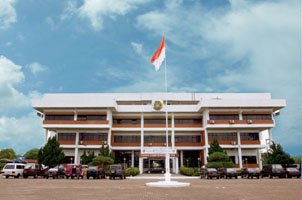skip to main |
skip to sidebar
HOPE FOR BETTER INDONESIA ARISES AHEAD OF ELECTIONS

by Rahmad Nasution
More than 145.7 million voters will flock to the polls in Indonesia on April 5, to decide the fate of 24 electoral contestants after a three-week nation wide campaign.
They will vote for 550 seats at Parliament and 128 members of Regional Representative Council, along with members of the provincial, district/municipality legislative assemblies.
In the April legislative elections, voters will elect their representatives directly for the first time and elect members of a Regional Representative Council, a new body in the modern history of the archipelago of more than 220 million people.
In Queensland, about 300 Indonesian citizens, mostly students of the University of Queensland (UQ)and their families, will also vote on the same day. Head of the Indonesian Elections Committee for Brisbane Feirully Irzal said Indonesian voters in Queensland were part of the 404,554 Indonesian voters overseas, or equalled to 21 seats in the House of Representatives (DPR).
This year's parliamentary elections, which will be followed by a presidential elections on July 5 and a possible runoff on September 20, will be held at the time the country is struggling to deal with its complex socio-political, security and economic problems it has had since the 1997 Asian crisis.
Threats of terrorism, separatist movements in the troubled provinces of Aceh and West Papua (Irian Jaya), slow economic development, high unemployment rate, and potential communal conflicts are serious domestic problems Indonesia is facing today.
Despite this condition, ahead of this democratic process, 24 political parties contesting in the elections have launched their electoral campaigns since March 11. The campaign period itself is scheduled to end on April 2 or three days before the D-day.
In Jakarta alone, the Indonesian media reported that about 10,000 police officers or two third of the capital city's force, were deployed to safeguard a series of the electoral process, including the campaign period.
What makes the ninth general elections different from the previous ones, including the 1955 elections that political analysts claimed to be the most democratic one? In this year's elections, the voters will not only punch one of the symbols of the 24 parties, but also the name of one of the legislative candidates available under the respective party symbol.
This time, the Indonesian Defence Forces (TNI) will no longer get seats in the House of Representatives (DPR), ending its long involvement in the country's politics.
For the founding father, former president Soekarno's family and his loyalists, these elections may be special because his three daughters --DM Sukmawati Soekarnoputri who leads the Marhaenism Indonesian National Party (PNI Marhaenisme), Megawati Soekarnoputri who is currently in power and leader of the Indonesian Democratic Party-Struggle (PDIP) and Rachmawati Soekarnoputri who chairs the Pioneers Party (Partai Pelopor) -- will compete each other.
The general elections may also be special for the former president Soeharto family. After being absent from politics since the resignation of Soeharto in May 1998, his first daughter, Siti Hardianti Rukmana alias Tutut, is now fighting back by joining the Concern for the Nation Functional Party (PKPB).
The PKPB, led by General (ret) HR Hartono, has tipped Ms Tutut as its presidential aspirant. If PKPB wins 20 percent of the votes in the April 5 elections, it will nominate Tutut is its candidate in the July 5 direct presidential elections.
During 32 years of the New Order regime, the Golkar Party always won the elections while the Moslem-backed United Development Party (PPP) and the Indonesian Democratic Party (PDI) came second and third. It became the political vehicle for Soeharto and his cronies.
However, in the June 7, 1999 general elections, held more than a year after former president BJ Habibie replaced Soeharto, the PDIP defeated Golkar by grabbing 35 percent of 462 seats in DPR.
At that time, the military (TNI) was still allocated with 38 DPR seats as part of its dual functions in the country's politics. Golkar was the runner-up followed by the PPP, the National Awakening Party (PKB), the National Mandate Party (PAN), the Crescent and Star Party (PBB) and the Justice Party (PK).
High expectation
How important are the parliamentary and presidential elections on the eyes of Indonesians?
Indonesians residing in Brisbane interviewed recently said they hoped the elections would turn out positive impacts on the future democracy and betterment of Indonesia, Australia's nearest neighbour in Southeast Asia.
For UQ's MBA student Triya Mardijono, the upcoming elections would bring a new hope for the entire nation to have a better economic and political condition though it seemed impossible to get a hundred percent honest, good and credible legislators who would fight for the sake of their constituents.
At least, these elections will be a stepping stone for Indonesians to bring themselves to a better future, Mr Triya said.
Indonesian PhD candidate at UQ'ss School of Politics Bonggas Adhi Chandra reminded Indonesians of not only relying on the result of the elections, but also to empower the civil society to enable it to control the elected government.
This civil society's control is so important to create a clean and accountable government, whose policies take side to the interest of the people.
In this case, freedom of the press must be maintained as one of the pillars of democracy we are developing, Mr Bonggas said.
Sharing Mr Bonggas view, in attempting to create the clean governance, combating corruption must be part of the coming government,s priorities, Eka Fitriana, who is taking up masters in Australian studies at UQ, said.
If the government could do it, the elections would be a promising corner stone to help get Indonesia out of its prolonged crises, she said.
On the presidential elections, another UQ postgraduate student, Ike Kusumawati, said of the 32 presidential candidates that the Jakarta-based Detik online media listed based on the nomination of political parties and the public, some had good reputation in society.
To be frank, I am not satisfied with the present government. But, now, some presidential candidates we have for these coming (presidential) elections can bring a new hope for us, Ms.Ike said.
Besides incumbent president Megawati Soekarnoputri, other candidates as listed by Detik online media are Amien Rais (PAN leader and chair of the People's Consultative Assembly), Susilo Bambang Yudhoyono (Megawati's out-going security minister who is nominated by the Democratic Party), and M.Hidayat Nur Wahid (chair of the Moslem-backed Prosperous Justice Party (PKS).
On whether the Megawati-led PDIP or other political parties will win the elections, Bonggas, who is currently writing his dissertation about the Association of Southeast Asian Nations (ASEAN) non-intervention policy, said, the world, especially the neighbouring ASEAN member states and Australia, was watching the Indonesian elections.
A secure and stable Asia Pacific was the common interest of all nations in the region. Thus, Indonesia's success in convening fair, transparent, accountable, and peaceful elections, were the hope of all because Indonesia was the biggest country in Southeast Asia with the biggest potential of intra-state conflicts , Bonggas said.
*) article ahead to the 2004 parliamentary and presidential elections. ANTARA published it on March 26, 2004.








No comments:
Post a Comment